Publications [810]
Nov. 26, 2020
Publications
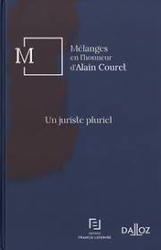
Full reference : Frison-Roche, M.A., Pour une conception humaniste du Droit des affaires et de son enseignement (For a humanist conception of Business Law and of its teaching), in Un juriste pluriel. Mélanges en l'honneur d'Alain Couret, Editions Francis Lefebvre and Dalloz, 2020, pp.985-990.
Read the article
Read the general presentation of the book in which this article has been published

Updated: Nov. 13, 2020 (Initial publication: July 15, 2020)
Publications

Référence : Frison-Roche, M.-A., Building by Law the unity of Compliance Tools from the definition of Compliance Law by its "Monumental Goals"", Working Paper 2020.
This Working Paper has been the basis for an article in the collective book Compliance Tools, 2020
___
Working Paper summary: The "tools of Compliance" do not stack on top of each other. They form a system, thanks to a unity drawn from the goals that all these multiple and different tools serve: the "Monumental Goals" by which Compliance Law is defined.
All these tools are configured by these goals and in order to master all these techniques, it is essential to put them all in perspective of what Compliance Law is, which is designed teleologically with regard to its goals. Extension of Regulatory Law and as, Compliance Law is built on a balance between the principle of competition and other concerns that public authorities claim to take care of. Compliance Law has moreover more "pretensions" in this respect, for example in environmental matters. All the means are then good, the violence of the tools marrying without difficulty with the voluntary commitments since it is the goals which govern this branch of Law.
As adopted legal solutions show, a common method of interpretation and common levels of constraint for all Compliance Tools result from this definition. Starting from the goals (in which legal normativity is housed), the interpretation of the different tools is thus unified, without the necessity of a legislation including all these Compliance tools. Moreover, the different degrees of constraint do not operate according to the consideration of sources (traditional legal criterion) but by the goals, according to the legal distinction between obligations of means and obligations of results which result from the articulation between tools, of which the establishment is an obligation of result, and the goals, of which the achievement is only an obligation of means.

Nov. 6, 2020
Publications
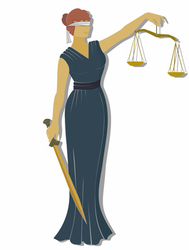
► Référence complète : M.-A. Frison-Roche, L'attractivité économique de l'impartialité juridictionnelle, document de travail, nov. 2020
____
🎥 Dans un premier temps, ce document de travail a servi de base à une intervention dans la conférence-débat présidée par le président François Ancel avec Madame la Conseillère Carole Champalaune, "L'office du juge, les enjeux économiques et l'impartialité", dans le cycle de Table-Ronde que la Cour de cassation organise sur le thème général de Penser l'office du juge.
____
📝 Dans un second temps et postérieurement à cette conférence, il avait vocation à servir de base à un article publié dans un ouvrage collectif. Il semble que ce projet n'ait pas abouti.
____
Présentation générale. Pour s'insérer dans l'ambition du cycle général de colloques qui est de "Penser l'Office du Juge" et dans celui-ci qui appréhende l'impératif d'attractivité économique de celui-ci, le propos dégage tout d'abord le rapport qui paraît contradictoire entre celui-ci et la distance que le juge doit conserver. Ainsi il est souvent affirmé que le juge devrait être à ce point internalisé dans les "places", notion économique de grande portée (à laquelle est consacrée la première partie de l'introduction, définissant la "place" à la fois comme un espace close et poreux et comme un "justiciable systémique") qu'il devrait ipso facto perdre sa distance, c'est-à-dire son impartialité. Comme les places sont en concurrence, même si l'on met en balance l'efficacité de la place, d'une part, et l'impartialité, d'une part, d'un juge qui lui est extérieur et se réfère au Droit, l'Impartialité en ressortirait nécessairement affaiblie. Il faudrait alors au cas par cas amener le juge à faire les concessions voulues.
Le propos vise à prendre la position contraire et poser que les places - notamment parce qu'il faut les distinguer fortement des marchés, dont elles furent les ancêtres - requièrent un juge, qui sont à la fois "singulier", c'est-à-dire avec une personnalité, un visage, des opinions, et en distance pour que sa fantaisie ne surprenne pas les places. En effet, celles-ci requièrent une justice humaine, et non pas mécanique et le juge singulier, dont le juge des référés ou l'arbitre sont l'épigone, répond à ce besoin. Mais pour réduire ces "marges de discrétion", façon dont l'économie qualifie l'impartialité d'une personne qui ne peut jamais être neutre, la façon de faire de ce juge doit être insérée dans des mécanismes qui diminuent ces marges. De cette façon, la place a alors un juge qui est toujours plus impartial, et ce faisant devient toujours plus attractive.
Pour obtenir cela en pratique, la place exprime deux attentes légitimes en tant que "justiciable systémique", dont la satisfaction accroit et l'impartialité du juge singulier et accroit l'attractivité de la place comme espace. Ce qui montre bien qu'attractivité de la place et impartialité du juge, parce qu'inséré dans des procédures et dans une institution et une famille juridictionnelle, ne sont non seulement pas contradictoires, mais sont au contraire convergents, l'un alimentant l'autre.
Concrètement, et la pratique juridictionnelle le montre, il faut consolider l’impartialité du juge singulier en l’insérant dans des processus collectifs. Comme il faut favoriser un rayonnement de l’impartialité par un renforcement de la « famille juridictionnelle ».
Pour consolider l'impartialité du juge singulier en l'insérant dans des processus collectif, il faut admettre sans hésiter la subjectivité du juge, la rechercher même, le juge des référés ou l'arbitre étant bien les épigones du juge adéquat. La réduction des marges de discrétion, définition de l'impartialité étant obtenue par l'insertion du juge dans une procédure dont il est seul le maître mais dans laquelle il n'est pas seul. Cela a pour conséquence technique qu'il est lui-même dans un débat contradictoire, non seulement pendant l'instance, mais encore avant celle-ci (dans les médias), par le jugement (et l'arrêt de la Chambre criminelle du 25 novembre 2020 est un modèle du genre) et après le jugement. En cela le juge montre que par son office il est dans le futur, comme le montrera la justice climatique. En outre pour limiter ses marges de discrétion, le juge singulier doit s'insérer dans un principe rationnel de cohérence, vertical et horizontal. Vertical parce qu'il intègre ce qu'il est dit et la technique de "l'avis déterminant" est à encourager, le juge singulier ne devant s'y soustraire que s'il a de "fortes raisons" pour le faire et selon cette règle générale Comply or Explain (qui est le contraire même de l'obéissance aveugle). Horizontal parce que le juge soit se tenir à ce qu'il a dit, l'estoppel étant elle-aussi une règle de logique. Mais surtout l'institution doit dégager le plus possible des "doctrines", par tous les moyens, dont les rapports annuels sont un exemple.
Pour consolider l'impartialité du juge singulier en renforçant la "famille juridictionnelle", il convient d'en avoir une conception plus large, ce qui pourrait mener à des "lignes directrices" communes à des juridictions diverses, et plus forte, en intégrant ceux qui entourent le juge pour mener jusqu'au jugement. En cela la procédure devant la Cour de Justice de l'Union européenne, travail sur un dossier commun, est un modèle. Si cette communauté était plus forte encore, l'office du juge rendrait un plus grand service encore qu'il ne fait déjà dans l'espace numérique.
Ainsi, des juges toujours humains, toujours divers, toujours singuliers, qui écoutent, considèrent et ajustent à la situation, qui au sein d'une famille juridictionnelle s'insèrent dans une doctrine institutionnelle qui les dépassent et les portent mais qu'ils transforment s'il y a une forte raison, toujours dite, pour ce faire : voilà l'impartialité incarnée rend ant une place économique et financière attractive.
Introduction. Quand j'ai choisi de consacrer quelques années à élaborer une thèse sur Le principe du contradictoire, en procédure civile, pénale et administrative, l'on m'avait conseillé de prendre un sujet plus étroit et moins basique. Quand j'ai été agrégée, l'on m'a conseillé de "passer aux choses sérieuses", c'est-à-dire au droit des affaires, mais c'est par une chronique de Droit processuel financier que j'ai débuté. Car ce lien entre la façon dont les juges progressent dans la façon de comprendre le cas (procédure) et arrivent jusqu'au moment de décider (jugement) est si fort avec la vie économique, comme les fils de chaine et les fils de trame, qu'on aurait bien tort de dissocier. Pour ma part je ne peux dissocier la solution trouvée et la façon d'élaborer celle-ci. D'ailleurs si les juristes anglais sont si précieux en droit des affaires, c'est sans doute parce que le contentieux leur coule dans les veines, que les techniques probatoires leur sont enseignées avec soin, que pour eux le juge est toujours virtuellement présent, assis à la table des négociations contractuelles, simplement actualisé si vient le temps du contentieux. De la même façon que Carbonnier disait que l'Etat est en France présent dans l'élaboration de tout contrat. Pour ne prendre qu'un exemple récent, quand je regarde comme tous les badauds les rebondissements de la saga Facebook, je mesure la dépendance dans laquelle et la Commission Européenne et cette entreprise que l'on dit toute-puissance sont par rapport au Président du Tribunal de l'Union européenne qui appliqua dans son Ordonnance du 29 octobre 2020 le principe du due process , lequel est la forme processuelle du droit au respect des données personnelles, pour réorganiser tout le mécanisme d'obtention des courriels échangés à l'intérieur de cette entreprise.
Pourtant quand j'écoute les représentants des grandes entreprises, ils ne semblent guère apprécier le Droit, qu'ils appellent généralement "réglementation", et encore moins les juges, ce qu'ils font et comment ils le font, c'est-à-dire leur office, les deux étant liés si l'on pose que "le juge applique la réglementation". Pour en rester à la perception des entreprises et sans entrer dans le sujet lui-même du rapport entre l'office du juge face à la loi
Mais si cela était si vrai, les entreprises cesseraient de tant vanter le modèle anglais, qui est décrit comme une sorte d'idéal dans presque chaque article, alors qu'il est si onéreux, ou le système américain, qui est si complexe dans son articulation entre les niveaux étatiques et le niveau fédéral que tout juriste américain est avant tout un processualiste.
L'idée est alors différente. Il ne s'agit plus de reprocher à la justice son inadéquation mécanique mais plutôt le fait qu'elle ne s'ajusterait pas aux besoins (avec le coût - accepté - de cet ajustement) du monde économique. En effet, le Royaume-Uni et les Etats-Unis seraient certes des sociétés juridictionnelles mais dans lesquels le juge aurait l'attitude adéquate : s'effacer derrière la loi des parties afin de mieux la servir. Les entreprises reprochent alors aux juges français ou allemand de ne pas suivre, participant en cela à ce qui serait ce grave défaut de l'Etat qui substitue sa volonté à celle des parties.
A lire divers travaux, les entreprises voudraient que l'Etat et ses juridictions se mêlent le moins possible de ce que les parties ont décidé tout en leur fournissent leur puissance au titre de ce principe de "sécurité juridique" portée au plus haut. Cette neutralité du principe de "sécurité juridique" qui utilise la force du Droit en lui ôtant pourtant la parole, utilisant le Droit et le juge comme des porte-voix, pose que les parties intéressées, qui sont les plus à même de mesurer leurs besoins et de construire les mécanismes adéquats, fassent leur "petite loi", puisque c'est par cette expression-là que Carbonnier désignait le contrat.
Mais comme dans le monde concret, l'idéal de l'ajustement contractuel pur et parfait n'existait pas plus que n'existe la concurrence pure et parfaite, un agent doit intervenir d'une façon neutre pour servir la petite loi quand l'autorégulation ne fonctionne pas, par exemple lorsque l'ajustement des intérêts ne perdure plus dans le temps. Comme Robespierre voulait un juge "bouche de la Loi", il faudrait un juge dont l'office serait d'être la "bouche du Contrat". Le juge anglais se définit sans doute ainsi, associant étroitement Impartialité et non-immixtion dans le contrat. Un juge non intrusif, qui jamais ne décide mais toujours sert.
C'est bien cette grille de lecture que le professeur d'économie d'Harvard a utilisé pour élaborer le classement Doing Business, qui mesure l'attractivité du Droit et du Juge, c'est-à-dire son aptitude à permettre aux entreprises, grandes ou petites, de se développer. Guy Canivet dans l'ouvrage qu'il co-dirigea à ce propos
Pourtant, cela non plus ne doit pas être si vrai, et l'association entre Impartialité et non-immixtion dans la situation initiale soumise au juge ne doit pas être si exacte, quand on entend par ailleurs tant de compliments argumentés adressés au Conseil d'Etat dans son appréhension du contentieux économique, que la suggestion est faite par des entreprises de lui en transférer la totalité de la connaissance, par exemple en matière de régulation financière et bancaire. Il ne paraît pourtant pas un juge effacé.
Mais c'est peut-être à force de lire les travaux d'Analyse Economique du Droit qui sont construits sur cette conception-là, que l'on finit par les recopier et peut-être y adhérer, souhaiter un juge qui ne dise jamais non, un juge mécanique. D'ailleurs ce que l'on appelle l' "intelligence artificielle" promet cela. Dans une justice non-humaine, la machine assure que la décision est prise avec une automaticité qui garantit une absence de parti-pris. Qui n'a pas d'âme ne peut être corrompu, qui n'a pas de raison ne peut se tromper. Cette passion actuelle pour les algorithmes, reposant sur la confiance faite aux machines et la défiance faite aux êtres humains, qui demeure les juges, repose sur un idéal de justice infaillible. Mais là encore c'est une erreur que d'associer Impartialité et Infaillibilité
Cette neutralisation du juge par les machines est généralement approuvée par les travaux. Elle n'est pourtant que le dépend de la solution plus artisanale et sanctionnée pénale consistant à neutraliser le juge par la corruption ; c'est un système juridique bien attractif que celui dont on est directement propriétaire... Mais les études montrent l'inefficacité économique pour une place de la corruption. Même si l'on laisse de côté l'appréciation morale de la corruption, l'effet sur l'image, etc., même si l'on imagine des entreprises qui n'adhèrent pas à "L'amour des Loi" posée par Rousseau, qui ne distinguent pas entre leur intérêt et leurs obligations - ne suivant les obligations que si elles ont un intérêt à le faire, la volonté du juge ne jouant plus alors que dans le jeu des incitations, qui placent le Droit et le Juge, comme des éléments de l'environnement des entreprises, il a été montré que les entreprises ne souhaitent pas un système juridique corrompu. La Commission Européenne a notamment publié des rapports sur la contribution directe de l'Etat de Droit et de l'effectivité de juridictions impartiales sur le développement économique d'une zone.
L'on semble donc confronté à une double aporie, menant à ce qui serait une sorte de souhait de disparition : soit il faudrait que le juge soit absent (pour en finir avec ce qui a été décrit d'une façon critique comme la "société contentieuse"), soit il faudrait qu'il soit un serviteur docile et neutre de la loi du contrat.
Parce que cela n'est pas admissible, le choc en retour est très violent. En effet, face à ce qui serait la prétention, voire l'exigence, des entreprises face au Droit, aux Juridictions et aux juges pris les uns après les autres (le juge pénal étant peut-être le plus détesté de tous...), la réaction est celle d'une sorte de rejet en bloc de cette demande des entreprises d'un juge qui prend en considération les effets économiques de ses décisions !
L'on lit alors en symétrie des rapports qui affirment que le "Droit n'est pas une marchandise", que le juge n'est pas un distributeur automatique de ces nouveaux bonbons sucrés que seraient les jugements devant faire toujours plaisir, que la notion de "marché du Droit" qui déclenche tant d'écrits théoriques, doit être rejetée. Car le Droit étant une valeur, la valeur de justice, le juge ayant pour office de concrétiser dans les cas particuliers cette vertu-là, ces prémisses d'adéquation de son office à ce qu'en attendent les entreprises, serait en quelque sorte attentatoire à la "grandeur de la Justice", réduite à l'état d'étalage où l'on propose à l'encan les jugements frais du matin aux acheteurs de systèmes juridiques, foi de forum shopping.
Bataille rangée, dont nul ne peut sortir gagnant, car les jugements sont à la fois une prestation et une valeur, Guy Canivet ayant montré l'apport de l'impartialité du juge à l'économie du Droit
Les entreprises savent qu'elles ne peuvent pas anéantir, sous les formes précitées, le Droit et les juges. Mais elles ne veulent pas non plus en dépendre totalement. Elles demandent comme tout un chacun un "juge en distance", car c'est ainsi que l'on peut définir l'impartialité : un juge impartial n'est ni un juge passif ni un juge mécanisé ni un juge transparent par rapport à la situation qu'il appréhende, c'est un juge qui par méthode parvient à se placer "en distance" par rapport à lui-même et à la situation qu'il a pour office d'appréhender
Mais en quoi cette exigence est-elle particulière pour les entreprises, par rapport aux autres justiciables ?
Car elles n'ont pas plus de "droit à un tribunal impartial"
Dès lors une décision nouvelle n'a pas le même statut pour un justiciable et pour ce justiciable systémique que sont les places. Tous dépendent de la justice et de sa qualité, et il est exclu de dire que les entreprises, notamment les grandes, devraient avoir une justice de meilleure qualité, que le commun des mortels. Précisément, le critère n'est pas là. En effet un justiciable aura besoin d'un jugement une fois. Les jugements rendus par ailleurs, avant et après, par ce juge ne le concernent pas car il ne reviendra pas. pour un justiciable systémique, c'est davantage les jugements futurs qu'il prend en considération. Les entreprises doivent pouvoir anticiper ce que dira le juge demain.
Pour cela, le juge ne doit pas pouvoir juger comme il l'est. Cette mise en distance par rapport à son propre pouvoir permet à la place d'intégrer par avance les jugements futurs (bons ou mauvais, là n'est pas le sujet), puisque les places sont des espaces de calcul et de probabilité, notamment les places financières.
Ce qui est donc à exclure est le "pouvoir discrétionnaire". En effet, un pouvoir qui tient entièrement en son dépendance celui sur lequel sa décision va porter est qualifié en Droit de "pouvoir discrétionnaire". Le pouvoir discrétionnaire n'existe quasiment plus en Droit français et européen. Un pouvoir ne doit pas pouvoir "disposer comme il le veut" de ceux qui dépendent de lui, si légitime, si puissant et si indépendant soit-il par rapport à eux.
Comme l'on ne peut, et l'on ne doit, pas nier le pouvoir du juge (car si on le nie, il l'exerce alors de fait, mais sans contrôle et sans limite), la demande des entreprises vient du fait qu'elles vont venir et revenir devant le même juge, la même juridiction, le même ordre de juridiction, le même système juridictionnel. Ce qui est attractif pour elles, c'est de pouvoir penser sur le moment qu'elles seront traités de la même façon dans le moment suivant : cette permanence dans le temps, quel que soit l'être humain singulier qui juge, constitue la qualité d'impartialité du juge. En cela, l'impartialité du juge est l'inverse de l'amitié entre Montaigne et La Boétie, il n'y a aucun phénomène d'élection, sans qu'il y ait de crainte pour autant. L'impartialité du juge garantit à l'entreprise qui viendra demain devant le juge qu'elle ne sera pas surprise par la façon incohérente dont son cas sera jugé.
Cette impartialité objective singulière du juge est une qualité qui constitue un élément d'attractivité majeure pour les opérateurs économiques.
Theme which has given rise to a large number of works, particularly in comparative law. The article 12 of the Code de procédure civile expresses what is the judge's mission with regards to the situation.
Canivet, G., Frison-Roche, M.-A. et Klein, M., Mesurer l'efficacité l'efficacité économique du Droit, 2007.
The positive Law related to the "judge's mistake" is itself very instructive, because it is not possible to reproach to the judge a mistake, except if there is a procedure fault, that is precisely the criterium developed in this study for the definition of impartiality. About this question, see Frison-Roche, M.-A., L'erreur du juge, 2001.
Canivet, G., Economie de la Justice et procès équitable, 2001.
Frison-Roche, M.-A., L'impartialité du juge, 1999.
Frison-Roche, M.-A., Le droit à un tribunal impartial, 2012.

Nov. 1, 2020
Publications

This working paper served as a basis for an interview organized by Olivia Dufour in French in Actu-juridiques-Lextenso on 11st of January 2021.
Sept. 24, 2020
Publications
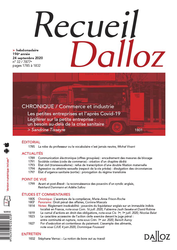
Full Reference: Frison-Roche, M.-A., L'aventure du Droit de la Compliance ("The Adventure of Compliance Law"), Chronique de Droit de la Compliance ("Chronicles MAFR - Compliance Law"), Recueil Dalloz, September 24, 2020.
Read the Chronicle (in French)
This Chronicle of Compliance Law is based on a bilingual working document with additional developments, technical references and hypertext links.
Read the Working Paper (written in English).
____
Chronicle Summary:
Compliance Law is an "adventure" in that it is a new branch of Law, anchored in Regulatory Law, which has freed itself from it while retaining the major principles to which it gives a new breath.
In the same way that I entered Sciences Po in 2000 to create a Master de Droit économique centered around Regulation Law, this new branch of Law, a Forum de la Régulation and a Chaire Régulation, now "20 ans après" and as in any adventure, the objective is to give solid, coherent and substantial bases to this Compliance Law which is practiced intensely without being fully conceived.
Compliance should not be reduced to a procedure of effectiveness and efficiency of other rules, such as Competition Law or Criminal Law, a sort of enforcement process going from the Ex Post to the Ex Ante, because that would be both too little (simply processes) and too much (the power of Compliance Law in the service of all rules, the violence of Compliance being able to serve in very violent Substantial Law itself, which one can observe in some legal systems).
It is necessary to anchor all this new branch of Law in goals, this Law being teleological in nature as is the Law of Regulation. These goals are "monumental", by which the public authorities express still, and more now than in the past, "pretensions", such as the protection of the environment or of people even if they are distant from the territory on which they have traditionally taken.
All these "monumental goals" converge towards a goal that encompasses them all: the protection of the person, which justifies the unusual power of legal Compliance mechanisms and the new relationship between States and "crucial operators". In this, Europe is exemplary of what could be this new branch of Law of which it bears the model.
______
Sept. 16, 2020
Publications

🌐follow Marie-Anne Frison-Roche on LinkedIn
🌐subscribe to the Newsletter MAFR Regulation, Compliance, Law
____
Full reference: M.-A. Frison-Roche, Se tenir bien dans l'espace numérique, in Penser le droit de la pensée. Mélanges en l'honneur de Michel Vivant, Lexis Nexis and Dalloz, 2020, pp. 155-168.
____
📝Read the article (in French)
____
English summary of the article: The digital space is one of the scarce spaces not framed by a specific branch of Law, Freedom also offering opportunity to its actors to not "behave well", that is to express and diffuse broadly and immediately hateful thoughts through Hate speechs, which remained before in private or limited circles. The intimacy of Law and of the legal notion of Person is broken: Digital permits to individuals or organizations to act as demultiplied and anonymous characters, digital depersonalized actors who carry behaviors that are hurtful to other's dignity.
Against that, Compliance Law offers an appropriate solution: internalizing in digital crucial operators the mission to disciplinary and substantially hold the digital space. The digital space has been structured by powerful firms able to maintain order. Because Law must not reduce digital space to be only a neutral market of digital prestations, these crucial operators, like social networks or search engines, must be forced to substantially control behaviors. It could be about an obligation of internet users to act with their face uncover, "real identity" policy controlled by firms, and to respect others' rights, privacy rights, dignity, intellectual property rights. In their Regulatory function, digital crucial firms must be supervised by public authorities.
Thus, Compliance law substantially defined is the protector of the person as "subject of law" in the digital space, by the respect that others must have, this space passing from the status of free space to the one of civilized space, in which everyone is obliged to behave well.
______
Read to go further:
- Frison-Roche, M.-A., L'apport du Droit de la Compliance à la gouvernance d'Internet, 2019
- Frison-Roche, M.-A. (dir.), Internet, un espace d'interrégulation, 2016

Sept. 10, 2020
Publications

This working document is the basis of an article written in French and published in the Recueil Dalloz in the Chroniques MAFR Droit de la Compliance (see the English presentation of this Chronique).
Read the presentation in English ot the other chroniques published by the Recueil Dalloz in these series Chroniques MAFR Droit de la Compliance

Updated: July 25, 2020 (Initial publication: July 1, 2020)
Publications

This working document served as the basis for an article, contribution in the collective book Compliance Tools, 2020
___
Summary of this working paper:
Training is a specific Compliance tool and a dimension that each Compliance tool expresses.
Firstly, as a training it is a specific Compliance Tool, it is supervised by Regulators. It even becomes compulsory when it is contained in Compliance programs. Since the effectivity and the efficiency are legal requirements, what is therefore the margin of companies to design it and how can we measure its result?
Secondly, as each Compliance Tool contains, more and more, an educational dimension, we can take back each of them to detect this perspective. Thus, even sanctions and prescriptions, are lessons: lessons given, lessons to follow. The question is then to know who, in this so pedagogic Compliance Law, are the "instructors"?
___________________________________________________________________
Introduction:
Training is akin to these things - and very precious - that we do, or even dream of doing, but so poorly expressed from the moment we take them as an object of technical writing. Just do it.
It would be however unfortunate to publish a book on Compliance Tools without giving a particular place to training, the piece would miss in the puzzle.
So much money spent by companies, by fair or foul means, especially when Compliance programs imposed as sanctions contain heavy training obligations leading people to retain word for word everything that is forbidden to them, in order to always abstain from now on. Training is thus the sharp point of such Hard Law appearing under the steel of Criminal Law's sword in amphitheaters and e-learnings.
But also so much speeches about the necessity of a "Compliance culture" which should be instilled to firms, Compliance spousing with joy in an harmony with their "raison d'être" and the historical identity of this group of people which is the company itself through trainings which tell Compliance as a link, an outstretched hand toward those with whom managers want to renew a moral contract in an ethic for which they give the good example. It is not Prohibition anymore but Communication and Community that set the tone of a human dialogue with employees, stakeholders, administration and judges.
It is possible to assume that the former does not exclude the latter, that Training should target all of this, the learning of mandatory prescriptions to follow without discussion but also the adhesion to guidelines, and this because everyone has understood that they are funded.
Everything and its contrary, then. "Learning by heart" takes here its full sense: get everyone to remember mechanically in order for no one to misstep (with always more machines which massively teach us the regulatory corpus on our mobile screens) but also succeed in bringing our "heart" in Compliance, thanks to specific training methods (with always smaller groups, with always less public discussions in pleasant places). Everything and its contrary, then.
It would be imperative but also sufficient to cumulate. Doing everything. Those who propose training softwares as those who organize conferences, meetings and travels and are favorable to this addition of face-to-face and distancing methods, of mechanic and of human relations. Concretely, at the end companies observe that since the first does not replace the second, costs add up. But, in Compliance, costs constitute a grave default of it, training taking a large part of this default. Managers end up finding the addition too heavy, especially if they thought that training of people is one of the public school's mission and not one of private companies' purpose!footnote-1837.
Moreover, training to Compliance is not outside Compliance Law, which makes it specific!footnote-1838. Indeed, Compliance Law, corpus of Ex Ante mechanisms, targets to concretize "monumental goals"!footnote-1836. Set by public authorities, these monumental goals are internalized in companies in order for them to implement expected means in order for them to be reached in the future. These monumental goals can be negative (that corruption, money laundering, human rights violations, financial system crisis, etc. shall not occur), or positive (that ecological equilibrium shall be restored, that education shall be supplied, that healthcare shall be provided, etc.).
Compliance Law takes as criteria of effectivity for implemented mechanisms, their reality, but also their efficiency, that is their ability to make sure their goal is achieved.Training must achieve its goal. Thus, in Compliance, the purpose is not only the one of every training, that is transmitting a knowledge in order to making the student more learned!footnote-1839, but it is to contribute to the "monumental goal" of Compliance Law itself, which is a practical goal and not a scholar goal. For example, training about the applicable rules concerning corruption should have an effect to reduce corruption. And because corruption is itself a part of Compliance Law, in the same way the Regulation Authority can force to educate oneself or train others, the Supervision Authority should control not only the reality but also the effectivity and the efficiency of trainings.
However, the effectivity and the efficiency of Compliance training, because they are full part of Compliance Law, should be controlled by the Authority not only in their reality but also in their concrete ability to participate in the pursued goal. Thus, to keep the example of fight against corruption, training plays in it an essential role because the firm faces an alternative: either a mechanic solution consisting in setting literal interdictions, for example the interdiction to give up a value greater than a certain amount (according to the "anti-gift" rule) with the risk of getting around that every literal prescription offers, or a a solution by training consisting in explaining to everybody that it is wrong to corrupt but that it is acceptable to give samples. Training rather bets on spirit while the machine integrates the letter.
But this refers to the Regulation and Supervision Authority which will appreciate the company due diligences to reach the goals. One observes that, more and more, Authorities economize one step: rather than explain to the companies how educate people that work for them or with them, regulators educate directly. Is on this point remarkable the "guide" published in 2012, whose second edition of 2019 has been updated in 2020, jointly by the Department of Justice (DoJ) and the financial regulator (Securities &Exchanges Commission - SEC) to know everything about the Foreign Corruption Practices Act (FCPA). Through the explanations offered to everyone!footnote-1840 of the principles, the reminded definitions, the told cases, they are behaviors prescriptions which are formulated especially for foreign companies by the prosecutor authority and the American sanction authority, allied in this handbook which has such weight that we can consider that it is as valuable as a guideline, soft law creator of Law and rights.
In the concentration of all powers which is often reproached to the Regulator, there is also the magisterium of the teacher, the one who educates stakeholders. After having assumed, on the American model, that the regulator should be the "advocate" of the rules for companies, proving to them the interest that they have to respect them, it is logical that, in what some have called "Regulation, Act 2" this Regulator's pleading about the good news of Regulation for the firm justifying thus that this one integrates it in Ex Ante was prolonged in magistral lesson: the "regulator-institutor" explains to everybody how using rules for an always still in progress Law ("Better Regulation").
While training was before only peripheral, it is now at the heart. If it is so important, as every other "Compliance tool", it should take what we expect from it. The publications about training most often exhibit what it should be and a sorrowful spirit measures what sometimes appears as a huge gap between descriptions and realities sometimes reported.
Educating being without any doubt one of the most difficult actions, we should probably neither describe a paradise of maieutics nor write a hot paper against what already has the merit to exist, but list what we can expect from Training mechanisms when they apply to Compliance, because here, rather more than for the other tools, it is a mean obligation. Which content should have a training ? (I). Because Compliance Law targets training as one of the mean to reach "monumental goals" which constitutes the substantial heart of this branch of Law, the training dimension is not limited to stamped training, finding back this pedagogical dimension in almost all the other tools (II). In that, Training appears as the alpha and the omega of Compliance.

July 15, 2020
Publications
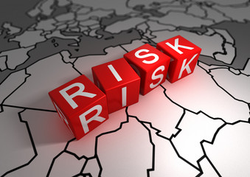
L'analyse des outils du Droit de la Compliance permet de mieux cerner ce qu'est le Droit de la Compliance dans son ensemble.
La "cartographie des risques" est analysée comme un outil essentiel de la Compliance, peut-être le plus important puisque ces cartographies sont des instruments élaborés en Ex Ante par les entreprises, ce qui correspond à la définition même du Droit de la Compliance, lequel est un Droit Ex Ante.
En cela, avant même de rechercher d'une façon plus analytique ce que peut constituer juridiquement l'activité pour une entreprise de dresser des cartes des risques qui l'entourent, pays par pays, activité par activité,
Le plus souvent l'on ne fait que décrire le mécanisme de cartographie des risques, sans le qualifier juridiquement. Le législateur ne fait pas davantage. Ainsi, dans l'article 17 de la loi dite "Sapin 2", la cartographie est décrite comme "la forme d'une documentation régulièrement actualisée et destinée à identifier, analyser et hiérarchiser les risques d'exposition de la société à des sollicitations externes aux fin de corruption, en fonction notamment des secteurs d’activité et des zones géographiques dans lesquels la société exerce son activité.". De la même façon, l'article 1ier de la loi dite "Vigilance" du 27 mars 2017 vise "une cartographie des risques destinées à leur identification, leur analyse et leur hiérarchisation".
Ce sont des descriptions, ce qui ne suffit pas à constituer une définition : le texte ne vise que la "forme" que cet élément d'information prend, sans en dire davantage. La lettre du texte descriptif inséré dans la seconde partie de l'article 17 de la Loi dite "Sapin 2, renvoyant à la première partie de cet article, le vise expressément comme une "modalité" d'une "l'obligation": cette "obligation" consiste à prendre des "mesures destinées à prévenir et à détecter la commission, en France ou à l'étranger, de faits de corruption ou de trafic d'influence". Pour bien remplir cette obligation, l'entreprise doit disposer de cet "outil" qu'est la cartographie des risques.
Si l'on sort du cas particulier de la lutte contre la corruption, la méthode est la même. Ainsi, de la même façon lorsqu'on consulte les documents par lesquels les Autorités de Régulation, par exemple l'Autorité de marché financier, présente la manière requise pour bien identifier les risques, y compris les risques de "non-conformité"!footnote-1734, l'on y trouve une description des façons de faire, mais sans davantage rencontrer de définition, encore moins de définition juridique de cette cartographie. L'on retrouve cette même tendance dans le procédé de la Compliance elle-même,
Peut-être que que cette absence de définition juridique de la Cartographie des risques n'est-elle elle-même que le reflet de l'absence plus générale du Droit dans dans l'ensemble des mécanismes de Compliance, absence paradoxale pour un espace si empli par ailleurs de la fureur pénale, sans doute parce que si souvent réduite dans sa présentation à un process mécanique, n'apparaissant juridique que sous son mauvais jour : celui de la sanction. Cette conception mécanique d'une Compliance comme process conduit à proposer que des machines et non des êtres humains en établissent les outils, notamment la cartographie des risques. Finis les compas et les cartes d'état-major, bonjour les bases de données et les connexions automatiques pour que des voyants d'alerte s'allument.
A lire les lois, il est acquis pour le législateur que la cartographie n'est qu'un "outil", la loi dite "Sapin 2" la désignant comme une "modalité". Prenant appui sur cette nature instrumentale, il faut donc chercher ce pour quoi est fait l'outil. Soit il est conçu pour que la loi ne soit pas méconnue, la cartographie repérant par exemple le risque accru que le Droit (souvent appelé la "réglementation") soit violé : c'est qu'il est usuellement désigné sous l'appellation étrange de "risque de conformité", terme que l'on trouve le plus souvent sous la plume de non-juristes et dont l'expression de "risque pénal" est sans doute l'ancêtre.
La cartographie permet alors à l'entreprise d'exécuter son "obligation de Compliance", c'est-à-dire de faire en sorte en Ex Ante que la loi soit respectée en éliminant par avance le risque qu'elle ne le soit pas. Ainsi dès 2008, l'OCDE définissait la cartographie des risques par ses objectifs, à savoir "mettre en place des moyens efficients pour réduire des risques de fraudes et de corruption et pour mettre en place des enquêtes efficients en concentrant les efforts sur les procédés efficaces". !footnote-1739.
Si la notion de corruption renvoie au Droit pénal, celle de fraudes est plus vaste que le Droit car si "la fraude corrompt tout" toute fraude n'est pas saisie par le Droit si la lutte pour la combattre n'emprunte pas un instrument juridique. Plus généralement et par ailleurs, de nombreux risques ne concernent en rien le Droit et devront pourtant être pris en considération par l'entreprise comme autant d'éléments d'information à considérer pour son action : les risques économiques, les risques naturels ou les risques politiques, ainsi que les "risques de marché", à propos desquels les Autorités de marchés, comme l'Autorité de marché financier dresse régulièrement une "cartographie des risques"!footnote-1740 . Mais cette cartographie-là ne semble pas regarder le Droit, alors même qu'elle ne relève déjà plus de la seule bonne gestion interne de l'entreprise.
Ainsi, si l'on choisit de consulte non plus les lois mais plutôt des cartographies élaborées par des entreprises, l'on doit constater leur diversité, sans savoir si ces cartographies constituent une "modalité" d'une obligation juridique, devenant de ce fait par transitivité un objet juridique, ou si elles constituent plutôt un élément de détermination de la stratégie de l'entreprise, appelant donc une qualification comme un "acte de management", ce qui est neutre pour le Droit.
L'on peut hésiter dans la réponse à apporter à la question, tout en soupçonnant l'existence d'une obligation générale de cartographier les risques, au-delà du cas particulier de la loi dite "Sapin 2" (dont le seul sujet est la corruption) car aujourd'hui de quoi le Droit ne se mêle-t-il pas ? Surtout d'un fait aussi important et prégnant et coûteux que la cartographie des risques, notamment dans des secteurs eux-mêmes "risqués" comme le secteur bancaire et financier, ou le secteur énergétique, ou (quittant la perspective sectorielle) dans l'espace digital ou dans le commerce international ?
Pourtant l'on observe à quel point la "cartographie des risques" n'a pour l'instant été que peu pensée en Droit. Il est vrai que le juriste, qui toujours ordonne, a du mal à suivre ... En effet, lorsqu'il est exposé que la cartographie doit viser à la fois des "risques économiques", des "risques politiques", et ces "risques de conformité" (c'est-à-dire de violation future du Droit), le juriste a du mal à comprendre comment les "risques de conformité" pourrait être un élément d'un outil qui n'est lui-même qu'un élément d'un "Droit de la Compliance", dont on lui affirme par ailleurs qu'il faut l'appeler "Droit de la Conformité" ? Même sans être expert de la théorie des ensembles, le juriste comprendre que cet élément de "conformité" ne peut pas être à la fois ce sous-ensemble et l'ensemble "conformité" dans lequel l'outil de la cartographie s'insère!footnote-1888.
L'on peut consulter de très nombreux écrits qui détaillent la cartographie, qui, par une sorte d'effet de miroirs, dressent des cartographies des exigences à laquelle l'entreprise doit se plier, pays par pays, textes par textes, secteurs par secteurs, loi par loi, aussi bien que des exigences de cartographies des risques de méconnaissance dans le futur de ces exigences ("risques de conformité").... Nous sommes face à un château de cartes, toujours plus minutieusement décrit, sans jamais rencontrer de qualification juridique.
Si l'on cherche pourtant une qualification juridique, ne serait-ce que pour produire de la sécurité juridique, l'on se demandera par exemple si l'acte de dresser une telle carte constitue un fait juridique ou un acte juridique. Je ne vois pas que la question ait été même posée. Pourtant, les conséquences de régime en sont immenses. En effet, à supposer que cela ne soit qu'un fait juridique, peut-il être un "fait justificatif" ? Les avocats y ont songé et ont plutôt trouvé du côté des Autorités publiques une porte fermée, lorsqu'ils ont voulu se prévalu des faits de diligences que constituent les cartographies de risques pour échapper à des sanctions...
Mais si dresser une cartographie n'était pas un simple fait mais pourquoi ne serait-ce pas un acte juridique ? La catégorie juridique des actes juridiques unilatéraux est là pour l'accueillir. Dans ce cas-là, la cartographie des risques engage l'entreprise et l'on observe que les autorités de régulation et de supervision, comme les juridictions, le conçoivent de plus en plus ainsi. Mais si l'entreprise est engagée par un tel acte juridique unilatéral que constitue la cartographie des risques, auprès de qui l'est-elle ? Plus précisément encore, si elle devient débitrice de l'obligation de cartographier, même si aucune loi particulière ne le lui prescrit d'une façon précise, alors il existe nécessairement un créancier bénéficiaire de cette obligation. Qui est-il ? Et pourquoi l'est-il ?
L'essentiel de cette contribution est de poser ces questions. Elles sont élémentaires. Elles ouvrent des pistes, celles que l'exercice de qualification juridique, de mise en catégorie juridique et de définition juridique, ouvrent.
Si pour l'instant l'exercice de qualification a été peu pratiqué, la cartographie des risques étant étrangement laissé aux algorithmes, aptes à entasser des données et inaptes à définir et à qualifier juridiquement, cela tient peut-être au fait plus général que le Droit et le risque sont peu souvent directement associés. Le mécanisme de bonne gestion que constitue la cartographie des risques, notamment dans les organisations qui ne sont pas des entreprises mais sont en charge d'administrer et adoptent sans contrainte cette bonne méthode!footnote-1735, y incite lui-même d'autant moins qu'on peut lire qu'il s'agirait, via ces cartographies, pour l'entité méticuleuse d'identifier par avance notamment le "risque juridique"!footnote-1731, c'est-à-dire l'application qui pourrait lui être fait du Droit, application incertaine, application contrariante. Combien de séminaires à succès sur le "risque pénal"... Comme en défense, les juristes exposent d'une façon trop générale que le Droit est constitué pour lutter contre le risque, lequel est un fait. En effet l'on répète à longueur de rapports que le système juridique est là pour "sécuriser", le réduisant parfois à cette performance technique tenant à sa nature même, par le principe de "sécurité juridique", que l'Etat par sa permanence, sa violence légitime, son imperium, nous donne en échange la paix, que le contrat par la "petite loi" qu'il constitue offre aux parties qui l'édictent un havre de sécurité pour cet îlot de stabilité dans un futur qu'on ne connait jamais tout à fait ; gare à nous si l'on sort de l'ordre juridique car l'on retombe dans le risque...
Ainsi, soit l'on est dans le Droit, assujettis aux exigences légales, et l'on bénéficie de sa sécurité spécifique, ce que les économistes désigneraient volontiers comme la "réglementation", soit on est dans la liberté de l'action, et l'on est alors dans le risque.... Il en serait comme pour les marchés, à propos desquels il faut choisir entre la liquidité et la sécurité : si l'on veut de la liberté d'action, alors il faut moins de réglementation, et donc moins de sécurité, plus de risque.... Cette opposition traditionnelle et si souvent relayée en économie est remise en cause par l'obligation de cartographie des risques car si ceux-ci sont établis, ce n'est pas pour les connaître en soi mais pour les combattre, au-delà de l'obligation classique d'information sur les risques, dont on trouve de nombreux ancrages dans les branches du Droit, notamment le Droit des sociétés, notamment celles exposés aux marchés financiers (I).
Dès lors, puisqu'il y a sous l'information classique de la prétention politique, de la volonté de "prévenir" le mal, qui se transforme rapidement dans la volonté de "promouvoir" le bien, le nouveau apparaît. La nouveauté est tout d'abord institutionnelle (II). En cela, la loi dite "Sapin 2", à travers l'instauration de l'Agence Française Anticorruption, a institutionnalisé ce mécanisme par lequel les entreprises "exposées" aux marchés financiers ou/et aux investisseurs internationaux, ou/et au commerce internationaux, présentent d'une façon claire et ordonnée -c'est-à-dire par une cartographie - les risques qu'ils ont identifiés dans leurs actions présentes et futures, rendant plus concrètement des comptes sur leur organisation structurelle d'analyse des risques. Des autorités publiques vont superviser les entreprises exposées à ces risques. Certes les banques y sont juridiquement accoutumées, mais les banques sont dans un secteur qui est régulé et supervisé. Ce qui est remarquable tient au fait que le Droit de la Compliance vient appliquer, via l'exigence de cartographie des risques, la technique juridique de supervision à des entreprises qui agissent dans des secteurs qui ne sont pas supervisés, voire qui ne sont parfois pas même régulés, par exemple l'immense champ du commerce international. De cette façon, ces entreprises, qui ne sont pas sectoriellement régulées, deviennent structurellement transparentes et supervisées au titre du Droit de la Compliance, qui contrôle notamment l'effectivité et l'efficacité du mécanisme de cartographie des risques.
Le principe libéral selon lequel une entreprise ne rend compte que de son comportement et non de son organisation interne en est entamé, puisque la cartographie des risques est un mécanisme Ex Ante qui relève de la structure même des entreprises et dont l'effectivité est contrôlée par les Autorités publiques. Ainsi, par la seule technique imposée par le Droit, la méthode de transparence, naguère propre aux entreprises supervisées devient générale à toutes les entreprises agissant sur des marchés ordinaires, dès l'instant qu'un risque existe. C'est une nouveauté radicale, puisque le risque dont il s'agit n'est pas un risque de secteur et qu'une crise générale n'est plus à craindre. La rupture est ainsi opérée avec le Droit de la supervision qui jusqu'ici était insécable du Droit de la Régulation, l'obligation de cartographie des risques s'appliquant à tout "opérateur crucial" exposé au risque de corruption, en ce que celle-ci doit être combattue d'une façon globale.
Dès lors, la cartographie des risque est un outil qui, au-delà de la simple description, prend sa définition d'une façon téléologique, comme est élaboré tout élément du Droit de la Compliance. Son but est de prévenir des risques qui compromettent des ambitions qui ne sont pas toujours de nature économique mais qui sont de nature politique (III). La lutte contre la corruption n'en est qu'un exemple, la loi dite "vigilance" exigeant elle-aussi une "cartographie des risques" en matière de droits humains, tandis que cette technique est reprise par des textes plus ou moins contraignant en matière environnementale. Certes des entreprises en position de porter de telles ambitions politiques, de force - en raison de leur position - ou de gré - par leur raison d'être ou par leur politique de responsabilité sociétale -, doivent le supporter, les transformant en acteurs politiques majeurs. Elles ne sauraient pour autant se substituer aux Autorités publiques, lesquelles d'une part fixent les "buts monumentaux" qu'il s'agit d'atteindre d'une part et qui d''autre part supervisent en Ex Ante et en Ex Post la mise en place et le fonctionnement de ces outils au sein des entreprises cruciales.

June 18, 2020
Publications

♾️follow Marie-Anne Frison-Roche on LinkedIn
♾️subscribe to the Newsletter MAFR Regulation, Compliance, Law
____
► Full Reference: M.-A. Frison-Roche, The dreamed Compliance Law, Working Paper, June 2020.
____
This Working Paper, "The Dreamed Compliance Law", is the basis for an article, written in French, "La compliance" (Compliance), inserted in the collective work to be published under the direction of Jean-Baptiste Racine, Le Droit économique du XXIème siècle (The XXIe century Economic Law , in the Serie Droit & Economie, LGDJ-Lextenso, 2020.
________
No one can know what the Law of the 21st century will be. Pretending to know it is just not to realize its ignorance. Why then writing about it, since the future is always surprising?
One can only write about the unknown part of the Law of tomorrow. If the future is then modeled on what was written, so much the better for the prophet, a tribute that can, for example, be paid to Pierre Godé
Lévi-Strauss argued that teaching is defined as dreaming out loud. Teaching and describing the Law of a century that we will never know gives even more freedom to dream about it. This freedom increases when the object is a branch of Law in the process of being born, state of the stammering "Compliance Law" of which some still maintain, as it was made for Regulation Law, that there is not existing. The hand can then, as it pleases, trace its beautiful or hideous features: what face will Compliance Law have, as soon as we assume that it will exist?
It may as well be a nightmare (I) as a happy dream (II).
It is up to us to choose in which category this branch of Law will flourish. Because what we can be sure of is this fulfillment. It is certainly already taking sides to presuppose the very existence of Compliance Law. Not only to consider it possibility with hostility because to be an enemy of something or someone is already to recognize their existence. Before that, two objections radically block the very existence of Compliance Law and their shadow remains in the future of it
Firstly, it is said that Compliance does not come under Law, but for example only ethics since it would consist in keeping well in companies which care about the interest of others or the planet, for example by spontaneous care of the environment; Compliance being a crystallization of social responsibility, the one for which we have our conscience, we express our "raison d'être" and we are not accountable
Second, there would be many Compliance mechanisms but insufficient to constitute a branch of Law. Indeed we would find Compliance in Company Law, Labor Law, Financial Law, Banking Law, Criminal Law, Administrative Law, European Law, International Law, etc.
These classic branches, which have been formed for so long, depending on the point of view adopted, would gain in modernity or be threatened with decay by this kind of extension which will be Compliance. There would thus be as many "little legal sectoral rules" as there are branches of law. These new internal developments would be like a new bud, on which care should be taken - if the tree regains its strength - or a weed to be eradicated - if the French garden loses its perspective.
Thus the matter being scattered as many as specialist lawyers, often criminalists or specialists in banking and Financial Law, then tomorrow all specialists in all branches of Law, this could constitute the most radical obstacle to the constitution of Compliance Law. Indeed, we would come back to confuse Compliance and the "modernization" of Law itself as a whole, since it would only be a question of perfecting each of the classic branches of the legal system.
If we keep in this half-sleep that is any projection in the future the hope of a constituted branch of Law, we must discard these two perspectives of annihilation, either in the total absence of Law or in recovery by all Law. To dismiss the sorrowful spirits who see no future in Compliance and keep only its enemies in the space of this article, let us assume that Compliance Law will exist in the 21st century. In what form and by what means, in the palm of which institutions, in the shadow of which legal system? Since it is a question of projecting ourselves onto the black screen of our nights of dreamy lawyers, let us take the current state only as a trailer. Like the one developed by the genius who by the contempt not only brought down into the flames of hell the cinema which has become a consumer industry with which producers force-feed us but offered us the vision of its future. What is what we see today the trailer? We let our imagination run wild since the trailer films are autonomous works compared to the film which follows them.
We have no idea what will happen and what we are watching from the brief and violent current images of Compliance Law, the cinema of which rather makes a hero of the whistleblower
Everything will depend on the concept that we will retain of Compliance Law. Because the script is not written, because Compliance Law is a Law with a political dimension, that it is defined by the ambitions that we can claim to have by setting monumental goals that we are going to achieve, a claim that will make it one major branch of the Law of tomorrow, or we can abandon any claim, lower our heads and arms, and reject any claim. It is then that the power of Compliance Law, which will be no less great, will turn against us, human beings, as in a nightmare.
Mélanges Pierre Godé, off-trade book, 2019.
Godé, P., Le Droit de l'avenir (Un Droit en devenir), 1999.
It is in particular the idea of the movement of analysis of Law & Literature which poses that by telling the past in one way or another, by thus inventing it, Law, and in particular the Judge, invents the future and being written, creates it. On this movement which was powerful in the United States, v. Cabrillac, R. et Frison-Roche, M.-A., Droit et Littérature, à paraître.
See infra I. Compliance Law as nightmarish octopus.
On the fact that "social responsibility" makes it possible not to be legally responsible, cf. Supiot, A., Du nouveau au self-service normatif: la responsabilité sociale des entreprises, 2004; this is not the subject of this article and this question will not be developed here.
See, for instance, ..., Replace Regulation by norm by Regulation by Data, 2020.
See, for instance, Frison-Roche, M.-A., Compliance Law (monography), 2016 ; Compliance Law, 2020.
On what the cinema does with the whistleblower, with the availability of trailers and extracts from the films, see Frison-Roche, M.-A., introduction of the article The impossible unicity of the legal category of whistleblowers, 2019.
Frison-Roche, M.-A., ... (retrouver sur LinkedIn).
May 28, 2020
Publications
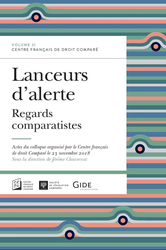
Full reference: Frison-Roche, M.-A., L'impossible unicité juridique de la catégorie des "lanceurs d'alertes" ("The impossible legal unicity of the category of "whistleblowers""), in Chacornac, J. (dir.), Lanceurs d'alertes, regards comparatistes, ("Whistleblowers, comparative perspectives"), Publications of the Centre français de droit comparé ("French Comparative Law Center"), May 2020, Volume 21, p.13-31.
Read the article (in French).
Read the general presentation of the collective book in which this article is published
Read the bilingual working paper which had served of basis for this article.
Read the presentation of the conference "Les lanceurs d'alertes: glose" (Whistleblowers: glose") and especially the slides elabored for the colloquium organized by the Centre français de droit comparé ("French Comparative Law Center") on 23th of November 2018 under the direction of Jérôme Chacornac
____
Introduction of the article
"Whistleblowers". This is a new expression. Which is a great success. Barely heard once, we hear it everywhere ...
A topic not of course or knowledge test, but rather a topic of daily conversation. Because it is spoken to us every day, in more or less gracious terms. For example President Donald Trump on October 1, 2019 declared to the press "want to question" the whistleblower who would have illegally denounced him and would not, according to him, have the right to conceal his identity, proof in this according to him of the lying character of his assertions against him, while his lawyer indicates on October 6, 2019 that he is not speaking on behalf of a single whistleblower thus taken to task but of a plurality of people who gave information against the President of the United States. Even the most imaginative screenwriters would not have written such brutal and rapid twists and turns. Spectators, we are waiting for the next episode, secretly hoping for the escalation.
And precisely if we go to the cinema, it is still a whistleblower whose dedication and success, we are told about, even the drama, for the benefit of global society, and in particular democracy, since the secrets are fought for the benefit of the truth. The Secret Man designates Mark Felt as the first whistleblower. Returning to what we often present as being a more "serious" media!footnote-1391, we listen to France-Culture and here is another story told by a historian who worked as an archivist on events that political power would have liked to keep hidden by possibly destroying their traces but which its trade led to preserve: here it is expressly presented to the studious listeners like a "whistleblower" .... While the same radio tries to find the one who could well be, as in a kind of contest the "first whistleblower"!footnote-1727? .... This rewriting of History can be defended because ultimately what did other Voltaire do for Calas, or Zola for Dreyfus?
It is also a subject of legislative discussion since in the United States the Dodd-Frank law of 2010 inserted in the law of 1934 which established the Securities & Exchanges Commission a complete device of remuneration and remuneration of the whistleblowers, whereas after having developed flexible but guiding lines in this regard in 2012!footnote-1698, the European Commission published on November 20, 2018 the text of what will become a Directive intended to give a unified European status to the character, in the system gradually developed to protect the one who was presented in 2018 as that "cannot be punished for having done what is right".
In Europe, the Directive first approved by a Resolution of the European Parliament on April 16, 2019 on the protection of persons denouncing breaches of Union Law and then adopted on October 7, 2019 (Directive of the European Parliament and of the Council of European Union on the Protection of Persons who Report Violations of European Union Law, different title, it should be noted, will have to be transposed into the laws of the Member States within the next two years. , since only "violations of Union Law" are targeted, but the character of the "whistleblower" is more generally targeted: he is "whole"!footnote-1699.
In short, the whistleblower is a star!footnote-1390. A sort of historical figure, covered in blows and glory, going from Voltaire to Snowden, both of whom find themselves embodied on the screens!footnote-1681 ....,
Consecrated by law, which associates with it a legal regime of protection to such an extent that, like a Nessus tunic, it is this legal regime which will define the character and not the reverse. When we read the law of December 9, 2016 relating to transparency in the fight against corruption and the modernization of economic life, known as "Sapin 2", we notice that the Legislator makes much of this character, since 'he dedicates its chapter II to him!footnote-1682: "From the protection of whistleblowers", and that it is by his very protection that he formally opens the door of Right to him.
But why a plural? Admittedly when we read the recitals of the Community Directive of October 7, 2019 on the protection of whistleblowers!footnote-1702, it is only a list of all the subjects on which it is a good idea to protect them, which therefore prompts us to see in this plural only the index of this non-exhaustive list of subjects which it is good to tell us, a sign of the lack of definition of who should alert us. Reading the French law known as "Sapin 2" makes it less severe but more perplexing. Indeed, this plurality referred to by the title of the chapter devoted to "whistleblowers", there is no longer any question in the rest of the law, in the very definition which follows, article 6 which opens this chapter devoted to "whistleblowers" offering the reader immediately a singular since it begins as follows: "A!footnote-1684 whistleblower is a person ...". No mention of diversity. The art of legislative writing would however have required that the qualifying article not only be singular but that it should not yet be undefined. Stendhal if he had still deigned to have the law for bedside book would have wanted to find at the beginning of chapter a sentence like: "The!footnote-1683 whistleblower is a person ...".
Thus seem to contradict themselves within the law "Sapin 2 the very title which presents the character, in that it uses a defined plural (the) while the defining article which presents it is in the undefined singular (one). ...
Here is a first reason not to advance any more but in a very careful way, in this "step by step" that constitutes a reading word for word: a gloss. This consists of taking the expression itself literally. The second reason for this technical choice is that the gloss is well suited to the introduction of a collective work, thus allowing more targeted developments to take place in other contributions, on the techniques, the difficulties and the limits of this protection, or on its history, or the reasons for the arrival in French law of these whistleblowers and the way they develop, or not, elsewhere.
I am therefore going to content myself with taking this already legal expression to the letter: The (I) whistle (III). blowers (II).
May 15, 2020
Publications
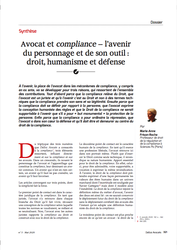
Full reference : Frison-Roche, M.-A., Avocat et Compliance - L'avenir du personnage et de son outil : Droit, Humanisme et Défense ("Attorney and Compliance - the future of the character and his tool: Law, Humanism and Defense),article of synthesis fo the collective publication "Compliance", Dalloz Avocat, March 2020, April 2020, June 2020, Dalloz Avocat, June 2020, p.321-324
Read the synthesis article (in French).
Read the editorial of the March 2020 Issue, presenting the problematic : "The Attorney, Vector of Conviction in the New Compliance System".
______
Summary of the article: In the future, the place of lawyers in compliance mechanisms, including in Ex Ante, will develop for three reasons, which emerge from all of the contributions. First of all because Compliance is a matter of Law, a lawyer is a lawyer and in the future it is a matter of Law and not on technical terms that Compliance demands its meaning and legitimacy. Then because Conformity must be defined in relation to the person, the lawyer expresses the humanist conception of the rules and Compliance Law will only be tolerable in the future if it is for "monumental goal" of protection of the person. Finally, because Compliance with ordinary repression, that the lawyer in his heart defends and must be and remain at the center of Compliance Law.
______

April 24, 2020
Publications

Its subject is the confrontation between the current health crisis situation and the Compliance Law.
Summary. After defining Compliance Law, distinguishing the procedural and poor definition and the substantial and rich definition, the starting point is to admit the aporia: the type of health crisis caused by Covid-19 will be renewed and it is imperative to prevent it, even to manage it, then to organize the crisis exit. Public Authorities are legitimate to do so, but because this type of crisis being global and the State being consubstantially linked to borders, States are hardly powerful. Their traditional International Law shows their limits in this current crisis and one cannot hope that this configulration will improve radically.
In contrast, some companies and markets, notably the financial markets, are global. But the markets are not legitimate to carry out such missions and counting on the generosity of certain large companies is far too fragile in front of the "monumental goal" that is the prevention of the next health crisis, crisis which must never happen.
How to get out of this aporia?
By Compliance Law, basis of, in a literal and strong sense, the "Law of the Future".
We need to be inspired by the Banking and Financial Compliance Law. Designed in the United States after the 1929 crisis to tend towards the "monumental goal" of the absence of a new devastating crisis in the country and the world, this set of new legal mechanisms gave duty and power of supervision, regulation and compliance to market authorities and central bankers. These are independent of governments but in constant contact with them. Today, they claim to have as first priority the fight against climate change. Now and for the future, they must also be given the responsibility and the powers to prevent a global health disaster, similar to a global ecological disaster, similar to a global financial disaster. This does not require a modification of the texts because their mandate consists in fighting instability. Stability must become a primary legal principle, of which the fight against monetary instability was only a first example. By the new use that central banks must make of it by preventing and managing health crises, Compliance Law will ensure that the future will be not catastrophic.
April 15, 2020
Publications
Complete reference : Frison-Roche, M.-A., Facebook, le coronavirus et la Compliance, Petites Affiches, avril 2020.
March 23, 2020
Publications

Without any request, on his or her newsfeed, those who surfs on the social network built by Facebook, has found on 23 of March 2020, in the morning, the following message :
« X (prénom de l'internaute), agissez maintenant pour ralentir la propagation du coronavirus (COVID-19) Retrouvez les actualités des autorités sanitaires et institutions publiques, des conseils pour ralentir la propagation du coronavirus et des ressources pour vous et vos proches dans le Centre d’information sur le coronavirus (COVID-19)" ("X (user's name), act now to slow down the spread of the Coronavirus (COVID-19). Find the health authorities and public institutions' news, advices to slow down the spread of the Coronavirus for you and your entourage in the Information Center about Coronavirus (COVID-19) »).
This corresponds to the more general declaration done the same day by Kang-Xing Jin, director of Health at Facebook, who declares : "In response to the coronavirus outbreak, Facebook is supporting the global public health community’s work to keep people safe and informed. Since the World Health Organization declared the coronavirus a public health emergency in January, we’ve taken steps to make sure everyone has access to accurate information, stop misinformation and harmful content, and support global health experts, local governments, businesses and communities.".
Thanks, Facebook to indicate how to do ; by the way, thanks to having invited me to do it. By the way, is it really an « invitation » ? Since the expression is « act now ». Just miss the exclamation point, and the pointed finger of Uncle Sam for « war effort »!footnote-1770.
If in Law, we can consider « invitation », it would be not to the "invitation" that in the past Bank of France did to shareholders banks to refinance a bank which risks to be soon into difficulties that we could consider, invitation from which the invited cannot really escape. No, obviously no, it is just the same message that you and me can write on our Facebook pages to tell similar things about the same purpose ! But, Facebook would be, like you and me, editor of contents ?
Questions and difficulties which encourage to proceed to the legal analysis to know under which title Facebook posted such a message.
The first hypothesis is that this firm has acted spontaneously, following its « Corporate Social Responsibility » (I) If it is the right qualification, with regards to the content of the message, legal consequences are important because this firm, without generalizing to others, by the expression of its care of common good, shows, by transitivity, that it is an editor.
The second hypothesis starts from the observation that Facebook is a « crucial digital operator ». In this perspective, the firm is constraint to Compliance Law (II). It is the reason why, it is constraint by specific obligations, that excludes the spontaneous message emission qualification. If it is the right qualification, with regards to the content of the message, legal consequences are also important and of a totally different nature. Indeed, the qualification leads to develop the relation between the obligation to fight against fake news and malicious websites towards those of redirecting towards public websites, benefiting for the operator of a reliability presumption.
Read the developments below.

March 22, 2020
Publications

This working paper is the basis for an article in the French Law Journal Le Clunet.
When we compare the terms "Compliance" and "Extraterritoriality", it is often with dissatisfaction, even anger and indignation. On the momentum, after having expressed a principle of disapproval of such a merger, attention is focused on how we can fight against it, to break the link between Compliance and Extraterritoriality. But do we have to go so fast? Is this negative initial assessment correct?
Indeed, thus gone, it is frequently explained that the binding mechanisms of Compliance are suffered, that they come from abroad!footnote-1750, that they apply with efficiency but in an illegitimate way, without agreement of the one who must submit to it, whose resistance is therefore certainly ineffective but nevertheless justified. In the same spirit, when we start to shell the cases, like so many scars, sort of rosary, even crown of thorns, BNPP case!footnote-1718, Astom case!footnote-1717, etc., the wounds not yet closed turn into reproaches made against the rules, public authorities, even reproaches made against named people.
We are leaving this kind of complaint against X, which targets what would be this appalling "Compliance", this Law which would be both hostile and mechanical which would not have been able to stay within the limits of borders, Compliance being thus placed in contrast to sovereignty and protection, which presuppose staying within its limits!footnote-1716 and being able to protect companies from abroad. More concretely, this presentation targets more directly the United States, which uses "the legal weapon", slipped under what is then designated as "the artifice of the Law" with extraterritorial scope. But this effect would in reality be the very object of the whole: their hegemonic will to better organize at least a global racket, notably through the Foreign Corrupt Practices Act (FCPA) and at best a world government through notably the embargoes.Those who believed otherwise would be naive or foolish. This silences the opponents because who likes this costume? So the world would be put in a ruled cut; what the mafia could not have done, Compliance Law would have obtained, offering the whole world to the United States thanks to the extraterritoriality of its national Law.
Compliance Law would thus become the very negation of Law, since it has the effect, even the purpose (barely concealed by strategic, powerful and shameless States), of counting borders for nothing, whereas Public International Law, in that it is built between the sovereign subjects of law that are the States presupposes the primary respect for borders to better exceed them while Private International Law takes the same postulate to better welcome foreign Law in situations presenting a foreign element!footnote-1726. Jurists believed in the force of Law; by Compliance, we would return to the sad reality that only the powerful, here the United States, dominate and - ironically - it is under the pretext of Law that they do it. It would be necessary to be well duped, or accomplice, to see there still legal where there is only the balance of powers. When one is more intelligent or skilful than that, one understands that the "small" can only be "subject" to the Compliance Law, one would have to be powerful to be the normative source and its enforcement agent. It is then towards this mis-named Department of Justice (DoJ) that the fearful, hateful and resigned glances turn.
If you see it that way, what should you do then? The answer is obvious: react!
It is necessary to save the sovereignty, France, companies, the Law itself. If that is how the question is posed, how can we disagree? It is therefore necessary to destroy the Compliance Law and the extra-territoriality of American Law which had found this "Trojan horse", an expression so frequently used. This is the basis for the administrative reports available, for example the Berger-Lellouche!footnote-1719 parliamentary reports and the Gauvainfootnote-1720 report. Both of them broadly develop the two preceding claims, namely that the extra-priority of compliance mechanisms is illegitimate and harmful, since it is a mechanism invented by the Americans and harming the Europeans, or even invented by the Americans to harm Europeans, the description being made in much more violent terms than those used here. The description seems acquired, the reflections therefore relate to the remedies. The reaction is most often to "block" the Compliance Law in its extraterritorial effect.
But without discussing the effectiveness of the remedies proposed downstream, it is necessary to return to this description so widely shared made upstream. Because many elements on the contrary lead to affirm that ComplianceLaw first of all and by nature can only be extraterritorial and that it must be. Whether or not the State in which it was created has malicious intentions. The description which is made to us most often describes particular cases from which we draw generalities, but we cannot reduce Compliance Law to the already cooled cases, as BNPP case, or to the always hot case of the American embargo on Iran. Furthermore, one cannot take the issue of embargoes and draw conclusions, legitimate for it, but which would apply to the whole of Compliance Law. The fact that theCompliance Law is a branch of Law at the stage still of emergence can lead to this confusion which consists in taking the part for the whole, but it is very regrettable because what is justified for the embargoes does not is in no way relevant for all Compliance Law, of which precisely the Law of embargoes is only a small part, even an abusive use. This overlapping is not often perceived, because the definition of Compliance Law and its criterion are not clearly enough defined, namely the existence of a "monumental goal"!footnote-1725, which does not exist in an embargo decided unilaterally by an order decreed by the President of the United States, but which exists in all other cases and fully justifies extraterritoriality, extraterritoriality which is even consubstantial with Compliance Law (I).
Once we have distinguished the embargoes, as an atypical, sometimes even illegitimate part, of Compliance Law, we should continue this work of distinction by emphasizing that the United States has certainly invented Compliance Law!footnote-1721 but only developed a mechanical concept for the prevention and management of systemic risks. Europe has taken up this systemic conception of the protection of systems, for example financial or banking, but superimposed another conception, drawing on its deep humanist tradition!footnote-1722, whose protection of personal data is only an example and whose monumental goal is the protection of the human being. This primary concern then justifies the European use of Compliance mechanisms to interfere with global objects regardless of their location, especially the environment, and to block the entry onto the ground of objects that enter, which is contrary to Competition Law but builds a legitimate barrier under this Compliance Law, in the indifference of an extraterritorial origin (II).
Indeed, this branch of the new Law which is Compliance Law is not reducible to Competition Law!footnote-1723, any more than it is not reducible to a method. It is a substantial, extraterritorial Law because the "monumental goals" which give it substantial unity are extraterritorial. This can directly contribute to the future of a Europe which on the one hand will be able to pursue, in an extraterritorial manner, monumental humanist goals, in the field of the environment or the protection of personal information or access to the Law (in particular by the technique of compliance programs) and which, on the other hand, by the techniques of traceability of products!footnote-1724, will have the means not to bring in products manufactured in an indecent manner, except in countries which do not grant value than in Competition Law to enter the WTO.
Read the developments below.
March 18, 2020
Publications
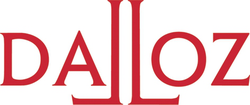
Référence générale : Frison-Roche, M.-A., L'avocat, porteur de conviction dans le nouveau système de Compliance, Dalloz Avocat, mars 2020.
This editorial opens a thematic collective publication about Compliance.
A synthetic article on all the contributions, published in May 2020, mirrors it: "Attorney and Compliance - The future of the character and his tool: Law, Humanism and Defense"
_____
English Summary of the article (written in French) :
If we perceive Compliance Law as an aggression of the private company and a binding set of mechanisms that have no meaning and added value for it, then the attorney has a utility: to defend the business. It can do so not only during the sanctions phase, but also to prevent it.
But this function is not central.
He and she becomes so if we understand Compliance Law as being a body of substantial rules, pursuing a "monumental goal": the protection of the person, goal injected by political bodies and taken up by the operator. From this, the company must convince everyone to take it back, inside the company and outside. In a general and contradictory debate, the attorney carries this conviction, because he and shed is always convincing those who in the end judge (market, public opinion, etc.) that is their raison d'être.
____

Jan. 17, 2020
Publications
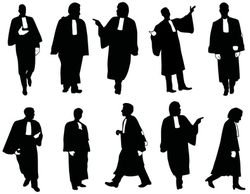
This Working Paper written in English is the basis for an article published in French in the French journal Dalloz Avocat , in March 2020.
Summary of the working Paper.
If we perceive Compliance Law as an aggression of the private company and a binding set of mechanisms that have no meaning and added value for it, then the attorney has a utility: defending the business. It can do so not only during the sanctions phase, but also to prevent it.
But this function is not central.
It becomes so if we understand Compliance Law as a body of substantial rules, pursuing a "monumental goal": the protection of the person, goal injected by political bodies and taken up by the operator. From this, the company must convince everyone to take it back, inside the company and outside. In a general and contradictory debate, the attorney carries this conviction, because he and she is always convincing those who at the end judge (market, public opinion, etc.) that is their raison d'être.
(In this short document, the pop-ups refer to the different works that develop each of the points)
Dec. 19, 2019
Publications
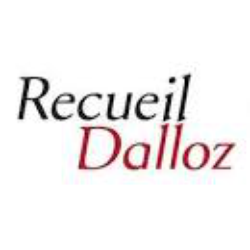
► Full Reference : M.-A. Frison-Roche, "Théorie juridique de la cartographie des risques, centre du Droit de la Compliance (Legal Theory of Risk Mapping, center of Compliance Law)", D.2019, chronique Compliance, p.
____
► English Summary of this article : The act of mapping risks is not currently defined by Law. It is only described in special laws. While risks mapping is central to preventing in Ex Ante the occurrence of crises or behaviors from which the occurrence is excluded, no legal regime is available, due to the lack of a legal definition available. This legal definition is proposed here in 5 stages, starting from special laws and specific cases to go towards a general conception. Risk mapping then appears as a concern for others taken care of willingly or by force by crucial operators, through a new subjective right: the “right to be alarmed”, the map being the structural counterpart of the character of the whistleblower. Two articulated systems of Compliance Law.
____
Read the article, published in French.
Read its translation in English.
_______________
Dec. 18, 2019
Publications
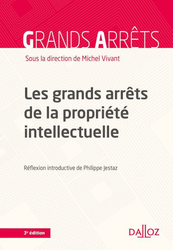
Référence complète : Frison-Roche, M.-A., Le maniement de la propriété intellectuelle comme outil de régulation et de compliance, in Vivant, M. (dir.), Les Grands Arrêts de la propriété intellectuelle, 3ième éd., 2019, 9-11, p.43-53.
This contribution is written in French.
Summary:
Intellectual Property, which comes from the State and is incorporated into public policy, can be designed not to reward the creator a posteriori, but to encourage others to innovate. It is then an Ex Ante regulatory tool, an alternative to the subsidy. If private copying is an exception, it is not in relation to the principle of Competition but in an insertion into a system of incentives, starting from the costs borne by the creator of the first innovation: the rights holder is then protected , not only according to a balance of interests involved but in order not to discourage innovative potentials and the sector itself. (1st decision) ;
The sectoral policy then permeates Intellectual Property, used to regulate a sector, for example that of the drug. While it is true that a laboratory wishing to market a generic drug did not wait for the expiration of the patent for the original drug to do so, it is however not relevant to sanction this anticipation by a few days because the investments made by the holder of the Intellectual Property right have been made profitable by this one and because the public authorities favor the generics in a concern of public health (2nd decision).
Systemic interest prevails and therefore Internet service providers have to bear the costs of blocking access while they are irresponsible because of the texts. This obligation to pay is internalized by Compliance Law because they are in the digital system best able to put an end to the violation of Intellectual Property rights which the ecosystem requires to be effective. (3rd decision).
Read the contribution (in French).
______

Dec. 11, 2019
Publications

► Référence complète : Frison-Roche, M.-A., Articuler les principes gouvernant les sanctions et les principes animant le Droit de la Compliance, décembre 2019.
____
► Ce document de travail a servi de base à la première des conférences faites dans le colloque qui s'est tenu sous la direction scientifique de Marie-Anne Frison-Roche et de Lucien Rapp, Les incitations, outils de la Compliance, le 12 décembre 2019, à Toulouse,
🚧 voir le document de travail, sous-jacent au thème général: Incitations et Droit de la Compliance, ayant conclu le colloque
Il a ensuite servi de base à un article dans l'ouvrage Les outils de la Compliance, dans la collection Régulations & Compliance.
Lire une présentation générale de cet ouvrage.
____
Résumé du document de travail :
_____
Lire ci-dessous les développements.

Nov. 27, 2019
Publications

This Working Paper served as the basis for an intervention in the conference organized in the conference cycle organized by the Journal of Regulation & Compliance (JoRC) on the theme: Compliance Tools, in collaboration with many university partners: this first conference is organized in collaboration with the Sciences po Economics Department and is held on November 28, 2019 at Sciences po and deals with the more specific theme of Risk mapping.
It also serves as the basis for the book edited by Marie-Anne Frison-Roche, Compliance Tools, which will be released in the Regulations & Compliance collection.
______
Is the consideration by Law of the Risk Mapping mechanism so new?
At first glance yes, and one might even be surprised at this novelty, since this rational anticipation of risks should have been recognized for a long time. But this is perhaps due to the more general fact that Risk itself has only recently become an autonomous legal object in Economic Law, in particular because Risk does not have at all the same position in Competition Law and in Regulation Law (I) .. Its position is even opposed in the both, Risk becoming central in Regulation Law. Compliance Law being the extension of Regulatory Law, it is also built on the "concern" of Risk and the internalization of this consideration in enterprises therefore takes the form of mapping.
A closer look maybe not,even before the specific French laws, called "Sapin 2" and "Vigilance" and beyond them, case law decisions giving a general scope to maps drawn up by operators, or increasing the obligation that 'they have to do it (II). In this, general and precise technical Law offers points of support for Compliance Law, strengthening it in its tools.
Nov. 20, 2019
Publications
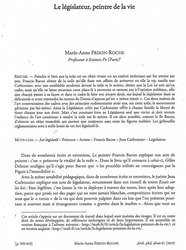
Référence générale: Frison-Roche, M.-A., Le législateur, peintre de la vie, in Archives de philosophie du droit (APD), Tome 61, 2019, pp. 339-410.
Résumé : Peindre si bien que la toile est un objet vivant est un exploit technique qui fût atteint par peu. Francis Bacon obtînt de la toile qu'elle fasse son affaire de préserver en elle la vie, tandis que Carbonnier, avec une semblable modestie devant la toile et le métier, obtînt que la Loi ne soit qu'un cadre, mais qu'elle ne laisse pourtant cette place-là à personne et surtout pas à l'opinion publique, afin que chacun puisse à sa façon et dans ce cadre-là faire son propre droit, sur lequel le législateur dans sa délicatesse et pour reprendre les termes du Doyen n'appose qu'un "mince vernis". Ces deux maîtres de l’art construisaient des cadres avec des principes rudimentaires pour que sur cette toile le mouvement advienne par lui-même. Ainsi la Législateur créée par Carbonnier offrit à chaque famille la liberté de tisser chaque jour son droit. Mais c’est pourtant bien au Législateur seul que revint et doit revenir l’enfance de l’art consistant à tendre la toile sur le métier. Il est alors possible, comme le fit Bacon, d’obtenir un objet immobile permet que surgisse sans cesse les figures mobiles. Les gribouillis réglementaires sont à mille lieux de cet Art législatif-là.
L'article ne comprend pas de reproductions, celles-ci figurent dans le document de travail.
Nov. 19, 2019
Publications

Toute la presse s'en fait l'écho.
Le conseil d'administration de la Banque européenne d'investissement s'est réuni le 15 novembre 2019.
Il a décidé d'exclure les financements, sous quelque forme que ceux-ci prennent
I. PREMIERE QUESTION : EST-CE EN TANT QUE LA BEI EST UNE "BANQUE PUBLIQUE" QU'ELLE FIXE UNE POLITIQUE CLIMATIQUE D'INVESTIMENT ?
II. SECONDE QUESTION : EST-CE AU TITRE DE SA "RAISON D'ETRE" EXPRIMEE PAR LES ACTIONNAIRES
Nov. 16, 2019
Publications

The Finance Bill has proposed to the Parliament to vote an article 57 whose title is: Possibilité pour les administrations fiscales et douanières de collecter et exploiter les données rendues publiques sur les sites internet des réseaux sociaux et des opérateurs de plateformes (translation: Possibility for the tax and customs administrations to collect and exploit the data made public on the websites of social networks and platform operators).
Its content is as is in the text voted on in the National Assembly as follows:
"(1) I. - On an experimental basis and for a period of three years, for the purposes of investigating the offenses mentioned in b and c of 1 of article 1728, in articles 1729, 1791, 1791 ter, in 3 °, 8 ° and 10 ° of article 1810 of the general tax code, as well as articles 411, 412, 414, 414-2 and 415 of the customs code, the tax administration and the customs administration and indirect rights may, each as far as it is concerned, collect and exploit by means of computerized and automated processing using no facial recognition system, freely accessible content published on the internet by the users of the online platform operators mentioned in 2 ° of I of article L. 111-7 of the consumer code.
(2) The processing operations mentioned in the first paragraph are carried out by agents specially authorized for this purpose by the tax and customs authorities.
(3) When they are likely to contribute to the detection of the offenses mentioned in the first paragraph, the data collected are kept for a maximum period of one year from their collection and are destroyed at the end of this period. However, when used within the framework of criminal, tax or customs proceedings, this data may be kept until the end of the proceedings.
(4) The other data are destroyed within a maximum period of thirty days from their collection.
(5) The right of access to the information collected is exercised with the assignment service of the agents authorized to carry out the processing mentioned in the second paragraph under the conditions provided for by article 42 of law n ° 78-17 of January 6, 1978 relating to data processing, the files and freedoms.
(6) The right to object, provided for in article 38 of the same law, does not apply to the processing operations mentioned in the second paragraph.
(7) The terms of application of this I are set by decree of the Council of State.
(8) II. - The experiment provided for in I is the subject of an evaluation, the results of which are forwarded to Parliament as well as to the National Commission for Data Protection at the latest six months before its end. "
This initiative provoked many comments, rather reserved, even after the explanations given by the Minister of Budget to the National Assembly.
What to think of it legally?
Because the situation is quite simple, that is why it is difficult: on the one hand, the State will collect personal information without the authorization of the persons concerned, which is contrary to the very object of the law of 1978 , which results in full disapproval; on the other hand, the administration obtains the information to prosecute tax and customs offenses, which materializes the general interest itself.
So what about it?
Read below.